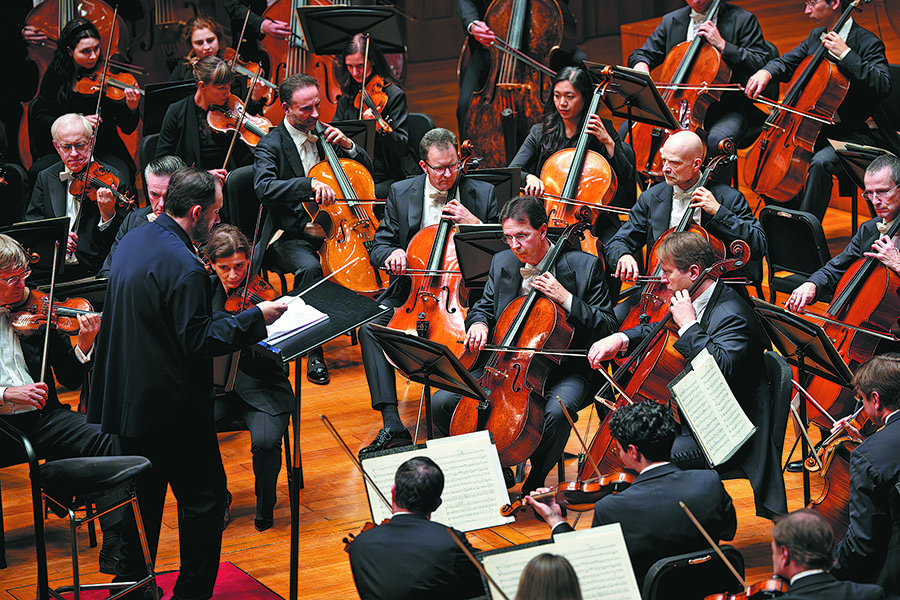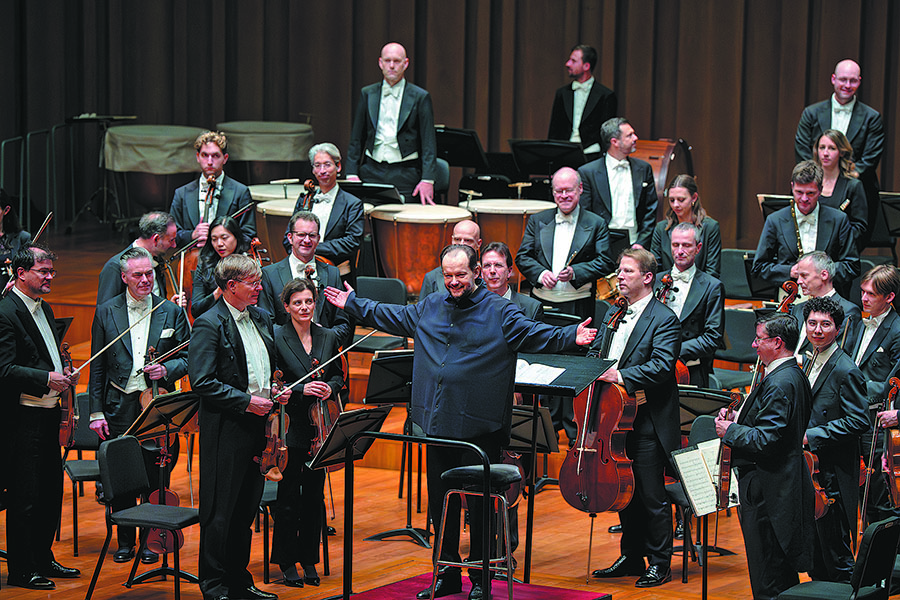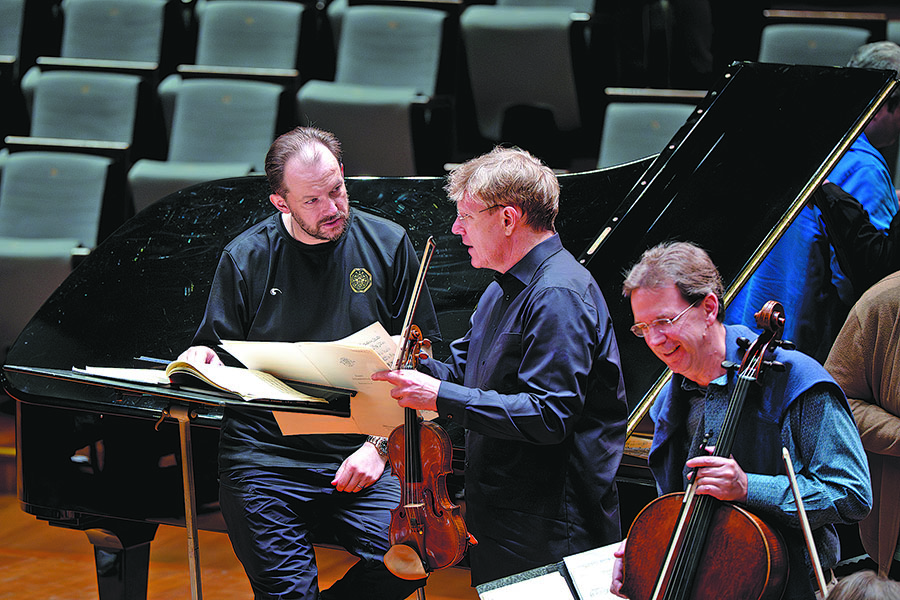
From last Sunday to Nov 6, the Vienna Philharmonic is touring China under the baton of Andris Nelsons, visiting Beijing, Shanghai, Xi'an, and Guangzhou, with a repertoire including pieces by composers such as Shostakovich, Dvorak and Beethoven. [Photo provided to China Daily]
Latest Chinese tour includes the capital after 11-year hiatus, with audiences eagerly awaiting the orchestra's annual New Year broadcast, Chen Nan reports.
After an 11-year hiatus, the Vienna Philharmonic returned to Beijing's National Centre for the Performing Arts, dazzling audiences over two consecutive evenings on Monday and Tuesday with an unforgettable musical experience.
Their eagerly awaited tour will also take the celebrated orchestra to Shanghai, Xi'an in Shaanxi province, and Guangzhou in Guangdong province, between last Sunday and Nov 6, to present eight concerts featuring a repertoire of symphonies, concertos, and symphonic poems, designed to demonstrate the depth and variety of symphonic music.
Founded in 1842, the Vienna Philharmonic is known for a unique structure that forgoes a music director or permanent conductor. This independence allows the orchestra to create its own sound. Their annual New Year concert, which is broadcast around the world, has cemented the orchestra's reputation as a global icon of classical music.
Leading it on this tour is Latvian conductor Andris Nelsons, a star of the new generation of conductors, and a philharmonic partner since 2010. His frequent collaborations with the orchestra — 121 performances and counting — have further solidified his status as one of the most important contemporary conductors. In 2020, he conducted the New Year Concert, his fresh approach gaining him global attention. He also led the philharmonic's 2022 and 2023 Summer Night Concerts, captivating audiences with his dynamic, masterful style.

Conducted by Latvia's Andris Nelsons, the Vienna Philharmonic returned to Beijing's National Centre for the Performing Arts on Monday and Tuesday. [Photo provided to China Daily]
"We've been touring China since 1973 and the warm welcome from the Chinese audience has left us with lots of beautiful memories," violinist Daniel Froschauer, chairman of the Vienna Philharmonic, said at the NCPA before the concert on Monday. "Music transcends language and speaks directly to the heart. This tour will allow us to share our passion with Chinese audiences, and experience the beauty of their own artistic traditions."
Froschauer says that when it came to preparing the program for this tour, the orchestra wanted to perform a range of music, not only to showcase the long musical tradition of which they are proud, but also new music they have never performed before, to keep it on a path toward the future.
The evening began with Shostakovich's Symphony No 9 in E-flat Major, Op 70, a lively and uncharacteristically lighthearted piece completed in 1945, which captures the euphoria at the end of World War II.
"Nelsons is celebrated for his authoritative interpretation of Shostakovich's work. The delicate agility of the strings and the playful woodwinds provided a vivid contrast to the solemn weight that usually accompanies ninth symphonies, adding a refreshingly whimsical touch," Froschauer says, noting that in the spring of 1945, Shostakovich, who was already a revered composer with eight symphonies to his name, composed his grand Ninth Symphony in homage to Beethoven's towering oeuvre. His piece defied conventions. In place of an epic, choral masterwork, he delivered a compact piece that was unexpectedly only 25 minutes in length. When it premiered in 1945, this unconventional symphony surprised and puzzled audiences with its brevity, subverting the lofty expectations normally associated with the genre.
Also featured in the program is Dvorak's Symphony No 7 in D Minor, Op 70, a piece inspired by the grandeur of Brahms' Third Symphony. Completed in 1885, it is a stirring piece, filled with emotional depth and national pride.

Nelsons (left) conducts a rehearsal at the NCPA in Beijing on Monday. [Photo provided to China Daily]
Other highlights include Beethoven's Piano Concerto No 3 in C Minor, Op 37, which is a masterful and intense composition that marks a significant development in the piano concerto form, and Richard Strauss' Ein Heldenleben, Op 40, or A Hero's Life, which is considered one of his most ambitious and innovative compositions. This piece blends autobiographical elements with grand orchestration to depict the life, struggles, and triumphs of a hero. Pianist Yefim Bronfman performed during the concerts in Beijing.
On Monday, the enraptured audience applauded vigorously, calling for encores. The orchestra responded with two famous Viennese pieces: Josef Strauss' waltz My Life Is Love and Joy, and Johann Strauss II's lively Tritsch-Tratsch Polka. The encore allowed the Vienna Philharmonic to display its trademark style of charm and technical elegance, transporting the Beijing audience to the heart of Vienna.
"Chinese classical music enthusiasts know the Vienna Philharmonic through watching our New Year Concert, which has been broadcast in China for years. It has helped us to gain lots of fans, for which we are grateful," says Froschauer, adding that the 2025 New Year Concert will take place on Jan 1, under the baton of maestro Riccardo Muti in the Golden Hall at Vienna's Musikverein. To celebrate the 200th anniversary of Johann Strauss II, eight of his masterworks are scheduled, with less familiar pieces programmed for the second part of the concert, including the Ferdinandus Waltz, which was written by Constanze Geiger, a contemporary of Strauss, and the first composition by a woman to be performed as part of the New Year Concert.
"We are thrilled to connect with Chinese audiences and celebrate our shared love for classical music. Whenever we return to China, we see many new concert halls, and feel the growing interest in classical music, particularly among young audiences," says Froschauer.
"To keep the orchestra's tradition, the key is to take on new and young musicians," says Michael Bladerer, general manager of the philharmonic, who also plays contrabass with the orchestra. "For this tour, we have some new members with us, who stood out from our Vienna Philharmonic Orchestra Academy. We know that there are many talented musicians from China, and we want to have them in our academy, and even become members."
The Vienna Philharmonic Orchestra Academy was founded in the summer of 2018. Its main objective is the training of young musicians through individual private lessons, and preparing them for chamber music, auditions, and orchestral training by working with the orchestra.
"We are often asked about the unique sound of the orchestra and the reasons behind its longevity. I would say that there is perhaps no other musical ensemble more consistently and closely associated with the history and tradition of European classical music than the Vienna Philharmonic," Bladerer says.
He adds that besides this history, the other notable aspect is the relationship between the Vienna State Opera orchestra and the Vienna Philharmonic. Only a member of the Vienna State Opera orchestra can become a member of the philharmonic. Musicians must prove their ability at the state opera over a period of three years before becoming eligible to submit an application for membership in the association of the philharmonic.
"Both Froschauer and I started by performing in the Vienna State Opera orchestra. Opera productions are full of drama, love and skill, which means the playing must be dramatic and passionate. We kept that passion when we joined the philharmonic," Bladerer says.